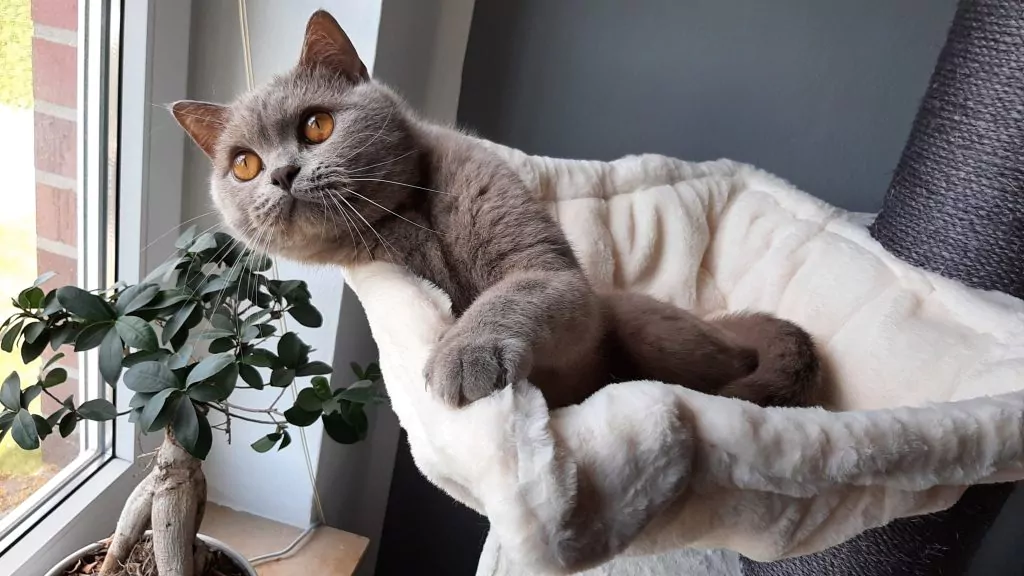The Ultimate Care Guide for Your British Shorthair
At Absolute British Shorthairs, we want every kitten we place to thrive in their new home. This comprehensive care guide is designed to help you give your British Shorthair the best possible life. Whether you’re a first-time cat owner or an experienced feline enthusiast, you’ll find helpful tips and advice to ensure your cat’s health, happiness, and well-being.


1. Preparing for Your British Shorthair’s Arrival
Before bringing your kitten home, make sure you have all the essentials ready: •Comfortable Bedding: A soft, cozy bed in a quiet spot will help your new kitten settle in. • Food & Water Bowls: Use shallow, sturdy bowls made from ceramic or stainless steel to avoid allergic reactions. • Litter Box: Choose a box that’s easy for your kitten to access, and fill it with high-quality, unscented clumping litter. • Scratching Posts & Toys: British Shorthairs enjoy mental stimulation and need scratching posts to keep their claws healthy.
2. Nutrition
Proper nutrition is essential for your British Shorthair’s health and growth. • Kittens (0–12 months): Feed a high-quality kitten food that’s rich in protein and essential nutrients. Offer three to four small meals a day until they’re six months old, then reduce to two meals a day. • Adult Cats (1+ years): Switch to a balanced adult cat food that supports healthy weight maintenance. British Shorthairs are prone to weight gain, so monitor portion sizes carefully. • Hydration: Always provide fresh, clean water. Consider a cat water fountain to encourage hydration. • Treats: Offer occasional treats, but keep them to 10% or less of their daily caloric intake.

3. Grooming & Coat Care
British Shorthairs have dense, plush coats that require regular maintenance: • Brushing: Brush your cat once or twice a week to remove loose fur and prevent matting. During shedding seasons (spring and fall), increase brushing to minimize shedding. • Bathing: Cats are generally self-cleaning, but occasional baths may be needed if they get particularly dirty. Use a gentle, cat-safe shampoo. • Nail Trimming: Trim your cat’s nails every 2–3 weeks to keep them from becoming too long or sharp. • Dental Care: Brush your cat’s teeth with a cat-specific toothpaste to prevent tartar buildup and dental issues.

4. Health & Veterinary Care
Keeping up with your British Shorthair’s health is vital for a long, happy life: • Vaccinations: Ensure your kitten receives all necessary vaccinations. Follow your vet’s recommended booster schedule for adults. • Deworming & Parasite Prevention: Use vet-approved treatments to protect your cat from fleas, ticks, and worms. • Regular Checkups: Schedule annual veterinary visits for wellness exams, weight checks, and overall health assessments. • Spaying/Neutering: If not already done, spay or neuter your cat at the appropriate age to prevent health and behavioral issues.
5. Exercise & Play
While British Shorthairs are known for their calm demeanor, they still need regular play and exercise to stay fit and healthy: • Interactive Toys: Use feather wands, laser pointers, or puzzle feeders to engage your cat’s mind and body. • Climbing & Scratching: Provide cat trees or shelves to encourage climbing and stretching. • Playtime: Dedicate at least 15–20 minutes a day to play sessions, especially for younger cats.

6. Socialization & Emotional Well-Being
British Shorthairs are affectionate and social cats that enjoy spending time with their families: • Bonding Time: Spend quality time with your cat each day, whether it’s through petting, grooming, or simply relaxing together. • Alone Time: British Shorthairs are independent and can handle being alone during the day. However, ensure they have toys and stimulation to keep them occupied. • Introducing New Pets: Gradually introduce new pets or people to avoid overwhelming your British Shorthair.
7. Common Health Concerns
British Shorthairs are generally healthy but can be prone to certain issues: • Obesity: Monitor their weight and provide a balanced diet with regular exercise. • Hypertrophic Cardiomyopathy (HCM): Regular vet checkups can help detect this genetic heart condition early. • Dental Issues: Consistent dental care reduces the risk of gum disease and tooth decay.

8. Transitioning to a New Home
The first few days in a new home can be stressful for your kitten. Here’s how to make the transition smooth: • Introduce Gradually: Allow your kitten to explore one room at a time before giving them access to the entire home. • Stick to a Routine: Keep feeding, play, and sleep schedules consistent to help them adjust. • Patience is Key: Give your kitten time to feel comfortable and bond with you at their own pace.
Welcome to the joy of British Shorthair ownership – your journey starts here!
Owning a British Shorthair is a rewarding experience that comes with lifelong responsibilities. By providing proper care, a healthy environment, and plenty of love, you’ll enjoy years of companionship with this incredible breed. At Absolute British Shorthairs, we’re here to support you every step of the way. If you have questions or need advice about your cat’s care, don’t hesitate to reach out. Together, we can ensure your British Shorthair lives a happy, healthy, and fulfilling life.
